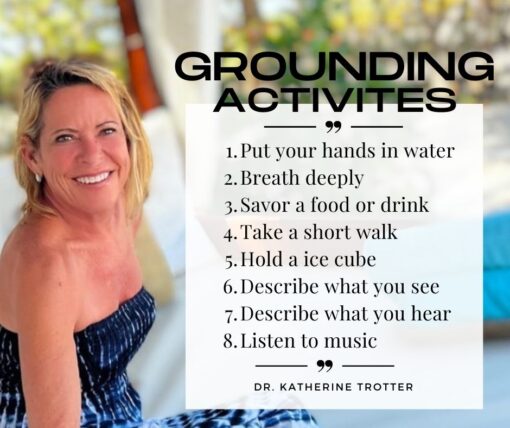 Grounding is a practical approach to anchoring oneself in the present moment. It involves various activities that can be incredibly useful in handling unwanted negative thoughts, reducing stress, and preventing mental zoning out.
Grounding is a practical approach to anchoring oneself in the present moment. It involves various activities that can be incredibly useful in handling unwanted negative thoughts, reducing stress, and preventing mental zoning out.
Grounding exercises are considered an essential component of managing anxiety or trauma symptoms, as they can help combat distress and promote self-regulation and calmness. Numerous grounding techniques can be learned, including deep breathing, specific active exercises, cognitive interventions, and meditation scripts. Acquiring these skills can empower you to manage challenging situations more effectively.
Grounding activities can be divided into three categories: mental, physical, and soothing. Mental grounding refers to focusing your mind, physical grounding refers to focusing your senses, and soothing grounding refers to kindly talking to yourself. Grounding activities are a set of coping strategies that can be used to manage various issues, including anxiety, stress, post-traumatic stress disorder (PTSD), panic attacks, dissociation, and anger.
Mental grounding involves focusing your mind and attention on something specific, such as your breathing, a particular object, or a happy memory. Doing so can divert your attention away from negative thoughts and feelings and bring your mind back to the present moment.
Physical grounding activities use your five senses to bring you back to the present moment. Examples include feeling the texture of a piece of clothing, smelling a particular scent, or listening to the sound of nature. These techniques can help you feel more grounded in your body and less in your head.
Soothing grounding activities involve talking to yourself in a kind and compassionate way. By reminding yourself that you are safe and that your feelings are valid, you can reduce anxiety and stress. These techniques can also help you feel more connected to yourself and others and provide a sense of comfort during difficult times.
Grounding exercises are not just for immediate use during an escalated moment. They are tools that, when regularly practiced, can decrease anxiety, trauma symptoms, and intense cravings. Remember, the key to mastering these techniques is practice. The more you make grounding a necessary part of your routine, the easier it becomes to manage your mental health.
Keep them handy for when you need them.
“Each of us is a vital thread in the tapestry of each other. We are woven together for a reason.”
